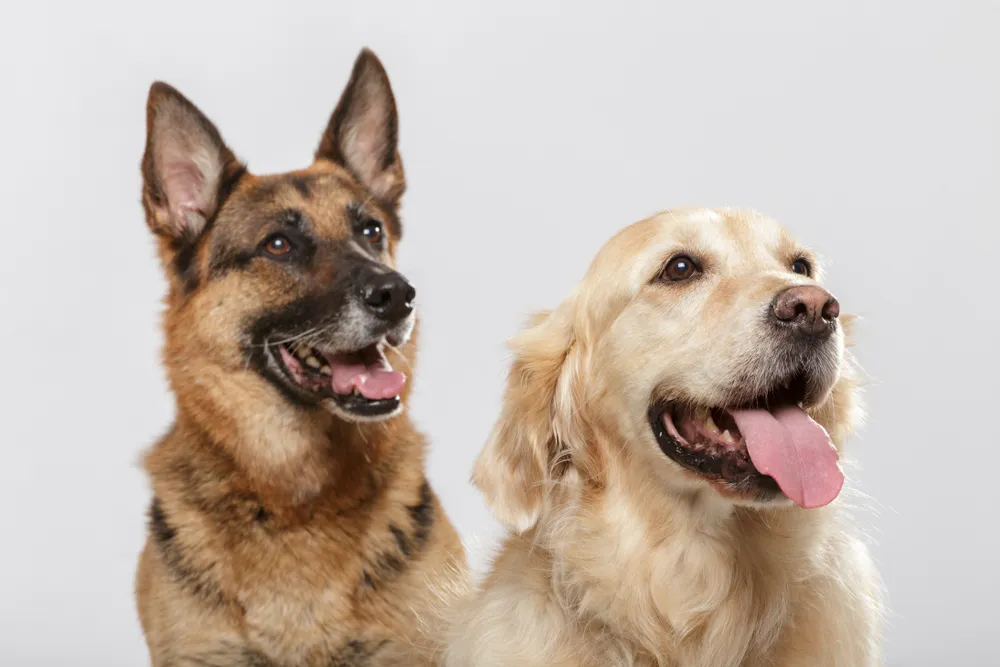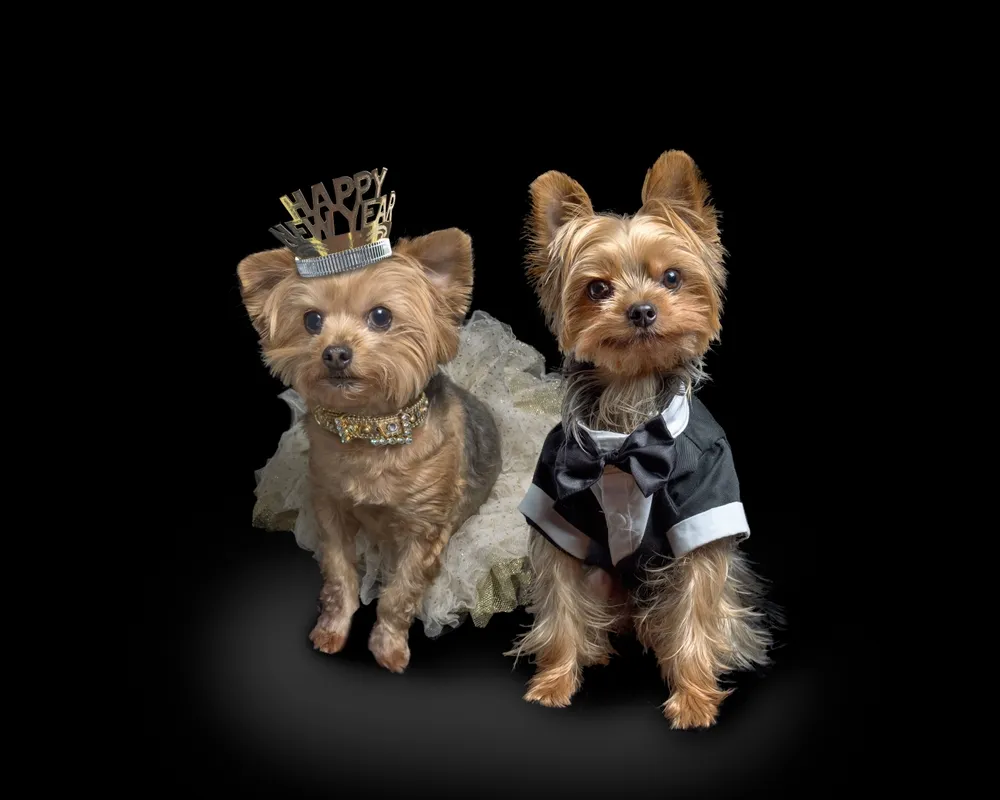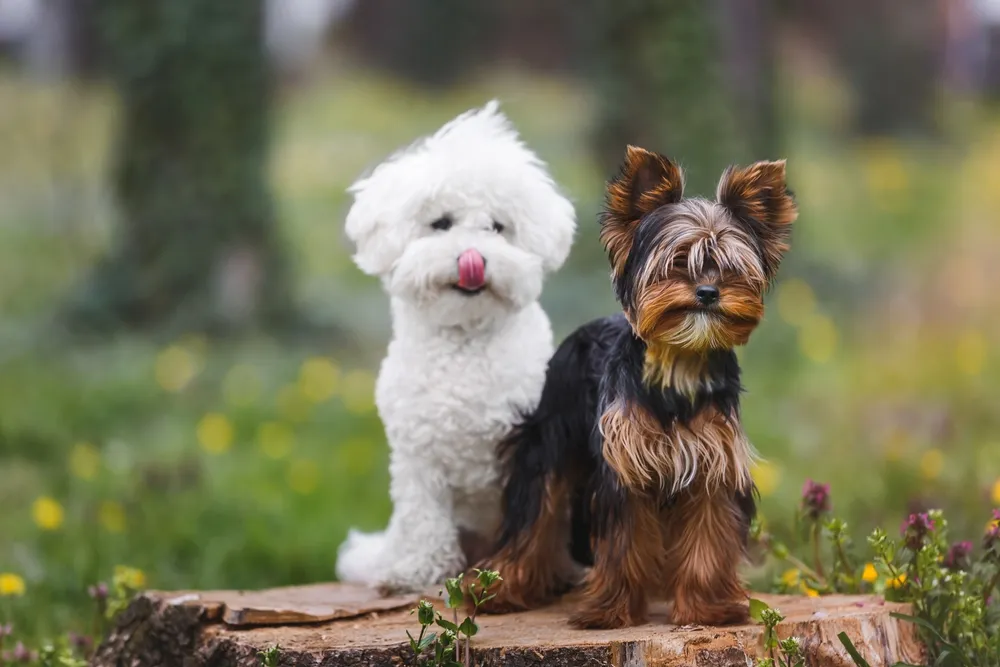Bringing a new dog into your home is an exciting time! If you already have a Golden Retriever, you’re likely wondering which breed will be the best fit. Golden Retrievers are known for their gentle and friendly nature, making them generally compatible with many other breeds. This article will explore some of the best companion dog breeds for Golden Retrievers, ensuring a harmonious and happy home.
 A Golden Retriever and German Shepherd are compatible dog breeds looking in the same direction and smiling.
A Golden Retriever and German Shepherd are compatible dog breeds looking in the same direction and smiling.
Understanding Compatibility
Before diving into specific breeds, it’s important to consider a couple of factors that influence compatibility between dogs: genes and gender. Two dogs of the same breed often get along well due to an instinctual kinship. However, when introducing different breeds, gender can play a role. Generally, a male and female dog combination tends to be the most harmonious. While two males or two females can coexist peacefully, there may be some natural territorial challenges to overcome. It’s all about finding the right balance and understanding the inherent traits of each breed. Thinking about introducing a service dog into your family? Consider reading about the best dog breed for anxiety service dog.
Why Golden Retrievers Make Great Companions
The Golden Retriever is a beloved family dog, known for its gentle, patient, and affectionate nature. Their calm temperament and loyalty make them excellent companions for children of all ages. Golden Retrievers are also known for their willingness to accept and befriend other dogs, making them ideal for multi-dog households. Whether you’re introducing a puppy to your adult Golden Retriever or getting two puppies at once, the Golden Retriever’s personality will contribute to a peaceful environment.
Golden Retrievers are generally accepting of a wide variety of dog breeds, including those perceived as more assertive, like Rottweilers, and more timid, like Italian Greyhounds. This adaptability is a testament to their easygoing nature.
Top Companion Dog Breeds for Golden Retrievers:
Here are some of the best dog breeds that typically get along well with Golden Retrievers:
- Labrador Retriever
- All Spaniels (Cocker Spaniel, Cavalier King Charles Spaniel, English Springer Spaniel, etc.)
- Beagle
- German Shepherd
- Pugs
- Goldendoodle
- Boston Terrier
- Poodle
- Rottweiler
When introducing puppies, it’s crucial to focus on training and socialization. Teaching puppies how to respect each other is essential, especially if one displays aggressive tendencies. While Golden Retrievers are not typically aggressive, their size can be intimidating to smaller breeds like Pugs.
 Two Yorkshire Terriers dressed as man and wife showcase how male and female dogs are the most compatible.
Two Yorkshire Terriers dressed as man and wife showcase how male and female dogs are the most compatible.
If you’re considering a protective breed like a German Shepherd or Rottweiler, pairing a female of that breed with a male Golden Retriever may be a good idea. Ultimately, you can’t go wrong with a Golden Retriever; their lovable nature makes them compatible with most other dog breeds. Thinking about a service animal? You might want to explore the best breed of dog for service animal.
Other Great Options to Consider
While the list above highlights some excellent choices, there are other breeds that can thrive alongside a Golden Retriever. Consider these factors when making your decision:
- Energy Level: Matching energy levels can prevent one dog from becoming bored or overwhelmed.
- Temperament: Look for breeds with a friendly and adaptable temperament.
- Size: While not always a determining factor, consider how a larger or smaller dog might interact with your Golden Retriever.
 The most compatible dog breeds are Labrador Retrievers and French Bulldogs, depicted here against a white background.
The most compatible dog breeds are Labrador Retrievers and French Bulldogs, depicted here against a white background.
Remember that individual personalities can vary, so early socialization is key to a successful multi-dog household. Also, consider the best companion dog for a german shepherd as your golden retriever.
Breeds to Research Further:
- Newfoundland: Gentle giants that are known for their patience.
- Bernese Mountain Dog: Affectionate and good-natured, they make great family pets.
- Cavalier King Charles Spaniel: Small and friendly, they enjoy companionship.
Creating a Harmonious Home
Introducing a new dog to your Golden Retriever requires patience and understanding. Here are some tips to help ensure a smooth transition:
- Supervised Introductions: Introduce the dogs in a neutral area under supervision.
- Separate Feeding Areas: Prevent resource guarding by feeding dogs in separate areas.
- Plenty of Attention: Make sure both dogs receive plenty of individual attention and affection.
- Consistent Training: Continue training both dogs to reinforce good behavior.
 Yorkshire Terrier and Bichon Frise sit on a tree stump in a meadow, proving that compatible dog breeds come in all shapes and sizes.
Yorkshire Terrier and Bichon Frise sit on a tree stump in a meadow, proving that compatible dog breeds come in all shapes and sizes.
Ultimately, the best companion dog for your Golden Retriever will depend on your individual circumstances and preferences. By considering the factors outlined above and focusing on early socialization, you can create a loving and harmonious home for your furry friends.
